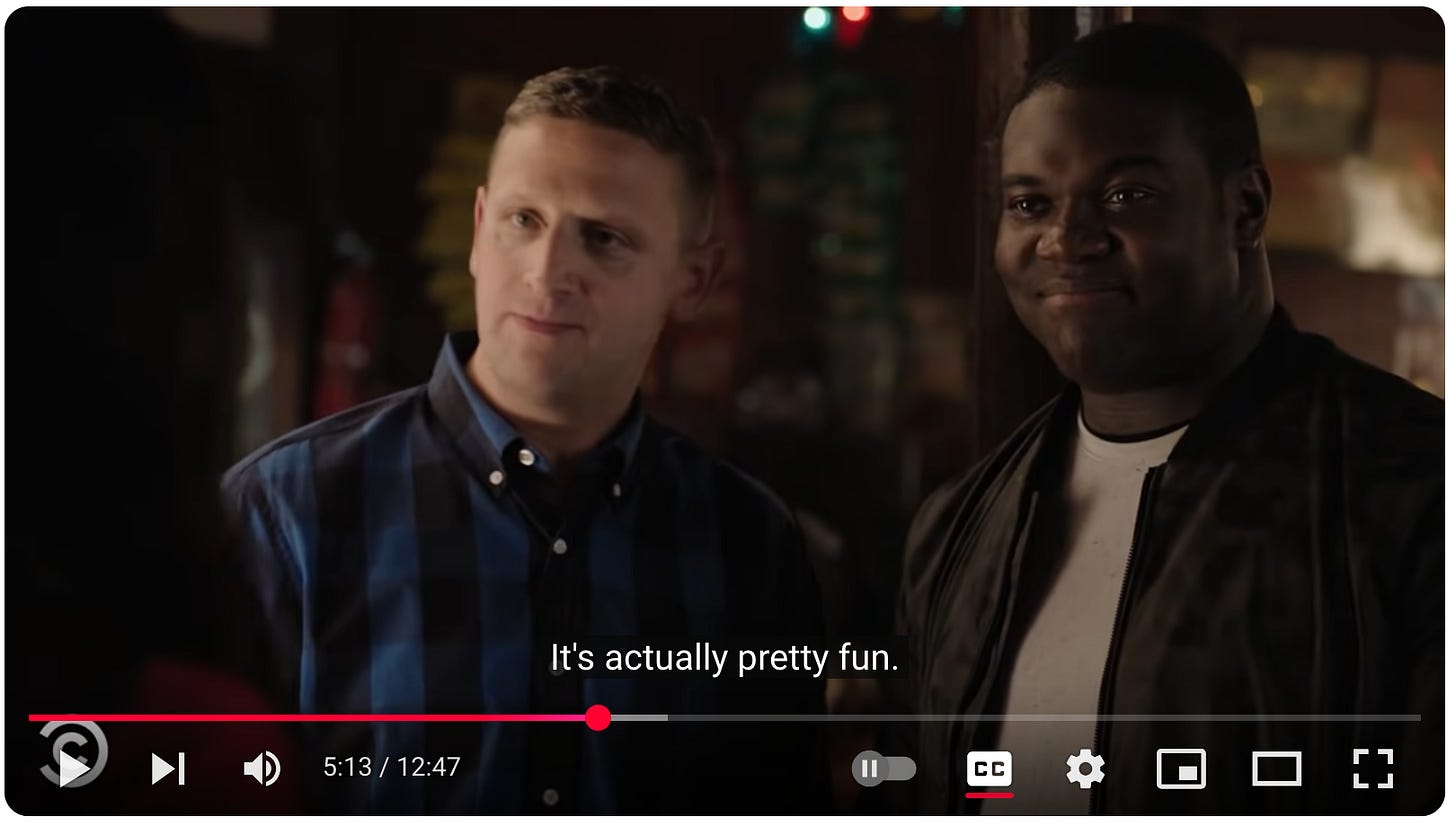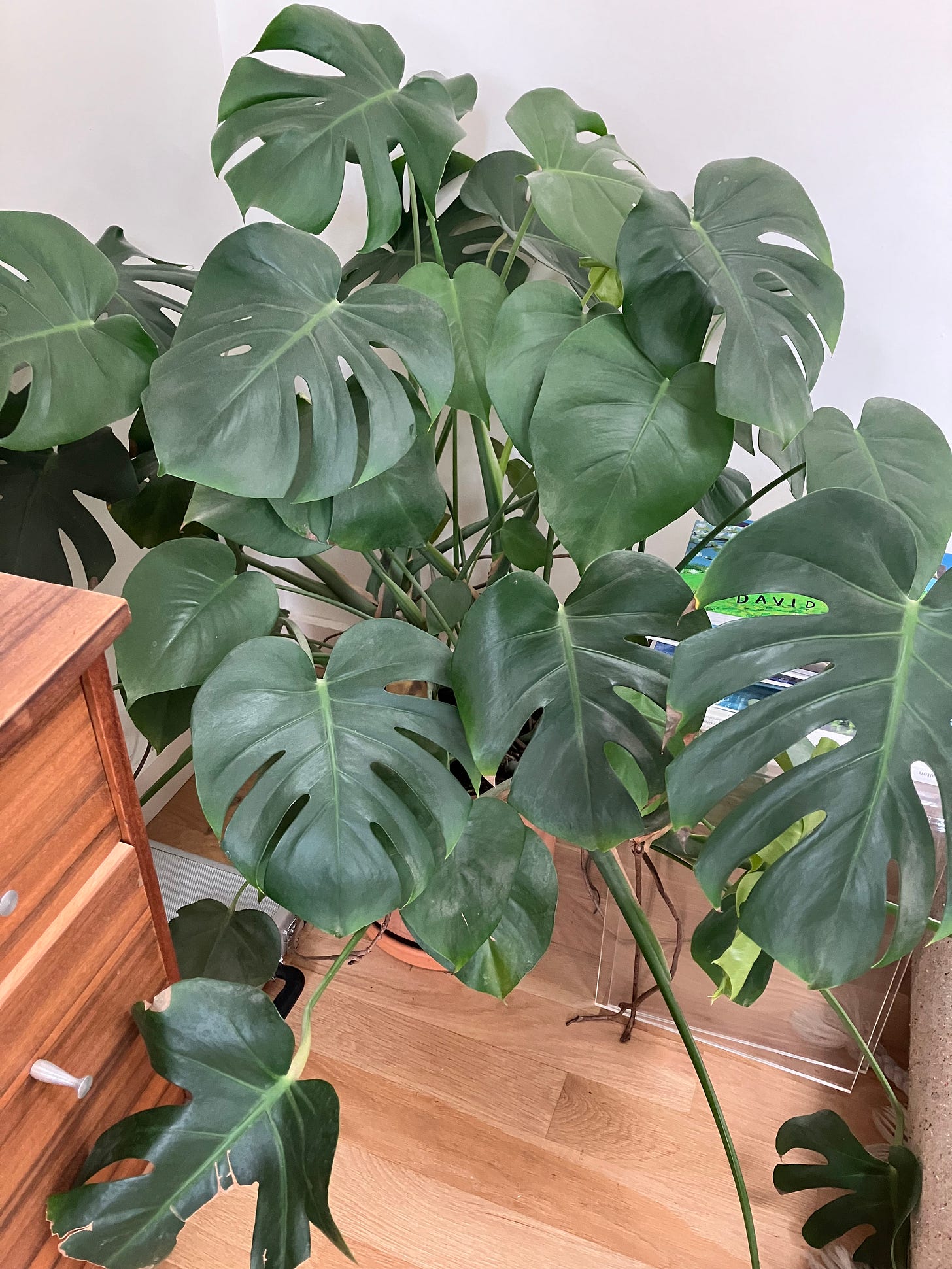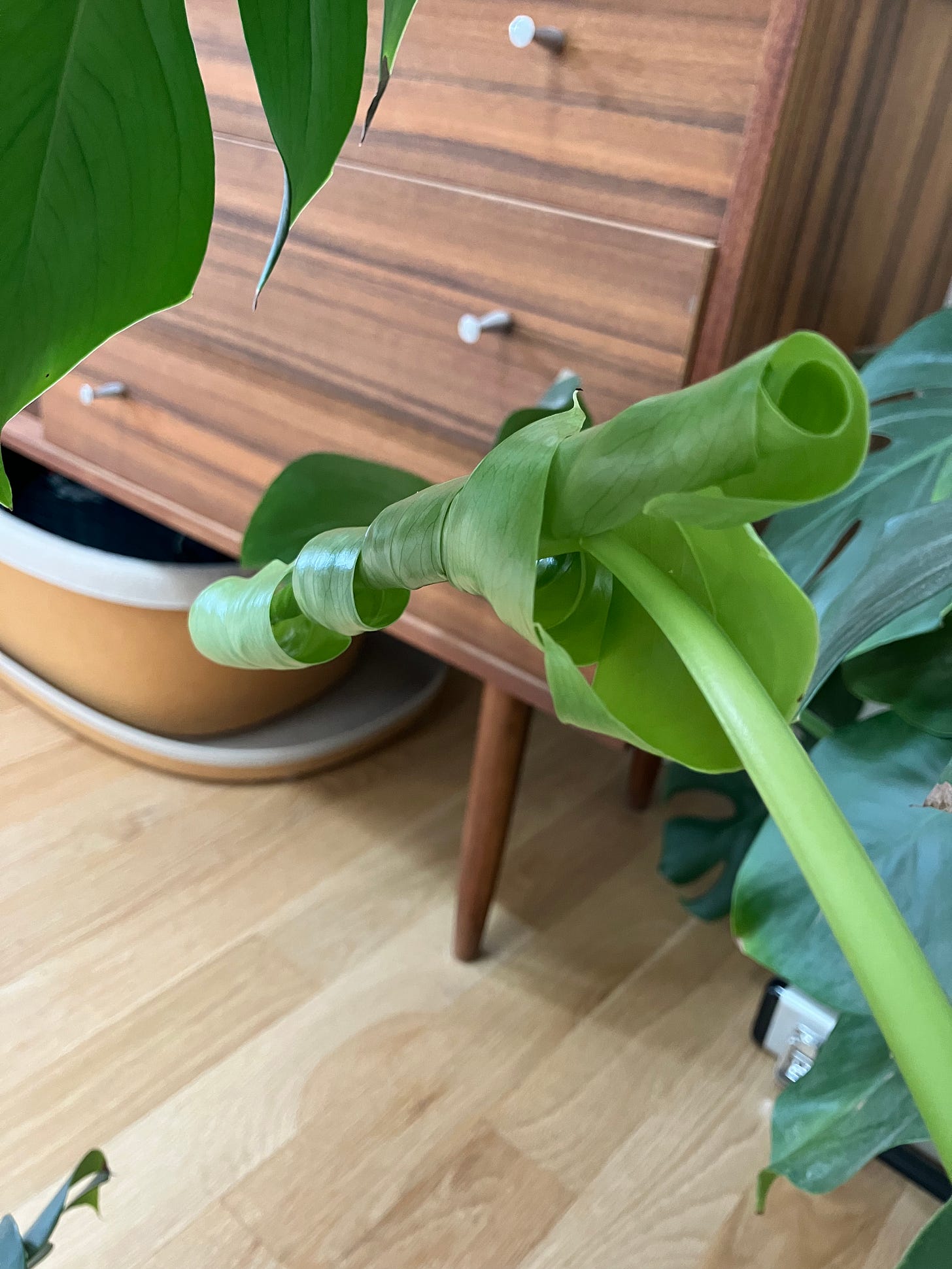It occurred to me, a few hours after the fact, that I’d spent my therapy session largely complaining about how boring it is sometimes to be a wife and mother. As soon as I realized this—that that’s what I’d done, I felt a bit… how to describe it? Not scandalized, but sort of.
Because usually what I’m doing publicly and even privately is the opposite. In my writing, I’m often trying to sell both motherhood and tedium. No, seriously, this is actually interesting! feels like a standard through line for me. Even though I can’t draw, I thought that an illustrated memoir would be my best chance to get people to read my thoughts on motherhood. That if I made it aesthetically pleasing, I could trick an audience into caring about a quiet, domestic life.
When I started that project (Resume Gap) in 2019, I’d recently read Sheila Heti’s Motherhood and had been so frustrated / jealous that she was able to publish a book titled Motherhood (boring!), make it look cool, and yet neither she (Heti) nor the main character of the book were mothers! I remember thinking that if I wrote an autofiction-style novel based on my experience as a mother (In 2019, I had a five-year-old and a three-year-old.) and called it “Motherhood”, no publisher would have bought it.
In fact, at the time I had written a book inspired by my experience as a mother that no publisher had wanted. Ha. Now, obviously, Heti is/was a much more successful writer than me, and probably would have had a New Yorker profile and a Leanne-Shapton-designed cover regardless of the title of her book, but still. It simply didn’t seem fair. I’d titled my own motherhood book Wildcat. Another example of trying to sell tedium. Sure, the main character is a mother, but she’s wild. She’s fun! This is funnnn!!!
When my kids complain about being bored, I have my go-to responses. “Good!” I like to say. And also: “Yeah, that’s part of life. Life isn’t always fun.” Just adjacent to these declarations is another one. One that I don’t shout at them but do think: “Fuck petty entertainment! Fuck needing to go places and do things. I have all that I want/need right here at home and inside my head!”
And while this is true—when I’m really into my writing, it honestly does feel like I have everything I need—it’s also a convenient argument for me, the writer/mother, a double occupation that doesn’t come with health insurance or a steady paycheck that might make it more feasible to “go places and do things.”
No, our family vacations follow wherever the grandparents are (Pittsburgh, North Carolina) or wherever the youth hockey season takes us (Riverside, California! San Diego, California!) For the record, Matt took Isaac to both of these tournaments this year and I stayed home, which was a vacation in its own way. But point being, I don’t generally feel aggrieved about any of this. Sometimes I’m even grateful for our financial and familial constrictions. There is a freedom in less choices, in less decision-making.
But I guess last week I hit a wall. I was bored. I wanted something else. Something exciting. Enter: admitting to myself and my therapist (who works with my insurance, by the way) that sometimes family-life is so boring.
Luckily, because of who I am, it didn’t take long until I found this admission (you guessed it!) interesting. It reminded me of something I heard on (you guessed it!) This Jungian Life. If you’re familiar with the show, the hosts are always talking about the concept of shadow. They must have explained it in a hundred different ways over their many episodes, but in this particular episode, one of them was reading from their book, Dream Wise: Unlocking the Meaning of Your Dreams, and they said:
The shadow is a living part of the personality and therefore wants to live with it in some form. It cannot be argued out of existence or rationalized into harmlessness.
This not only made sense to me: that though this is the life I’ve chosen and deeply want (a cozy domestic life, dogpiling on our bed, watching the movie Flow for a second and then third time), my shadow, i.e., the opposite of a cozy domestic life also wants to live and cannot be argued out of existence.
Also interesting to explore is what this shadow manifested might look like. What is the opposite of a cozy domestic life? Yes, you guessed it! The plot of All Fours by Miranda July.
Remember? I’d been wondering about this, about why this specific version of Miranda July was bothering me? (Another way that the hosts of This Jungian Life explain shadow is for one to consider the people that bother us, the people we go on and on complaining about to whomever will listen. Oftentimes, these people are embodying our shadow selves, i.e. the parts of ourselves we’ve banished and/or disapprove of.)
But, and this is important (to me at least), it’s not just that the narrator of All Fours, a wife and mother in her forties, effectively leaves her domestic situation for something much less domestic. For something wild, you might say. It’s that everyone—readers, the literary world, and critics—was so on board for this.
See, I think that if I’d stumbled upon All Fours on my own—without having been led to reading it by a sea of people telling me I had to read it—I would have probably enjoyed the book and been done with it. (For the record, I did enjoy All Fours, and as a writer, I’m jealous of how compelling the opening few pages are and also of how consistently funny and readable July is.) But at some point, maybe when I saw that July was nominated for a National Book Award, the chorus of praise began to grate. It began to feel like people weren’t just championing the book because it’s a good book but because the trend right now, at least in my immediate lefty circle, is counter-tradition. It feels like everyone wants us women in our forties to abandon our suffocating families and obligations so that we can go and be free! Freeee!
I really liked what the writer Kristen Iskandrian said in a recent Substack post:
When ‘the best’ a writer can hope for ‘these days’ is having their book optioned for a show or movie on a highly mainstream platform, and every poet is writing a memoir hoping for same, and Miranda July has become the voice for menopausal women everywhere—this, to me, feels like the real singularity.
Iskandrian is commenting on more than All Fours here, and you should read her whole post. But I’m quoting her because it felt like an Emperor’s-New-Clothes-y moment to me. It felt like an admission that most of us women in our forties don’t actually want to become possessed by a nonsensical crush, redecorate a motel room at great expense, and open up our marriages.
The irony for me, perhaps, is that I’ve already said all of this. And not on this here web log. I did it in my novel, Wildcat (which eventually did find a publisher, hallelujah). The book features a young mother and writer named Leanne who is struggling with the confines of her domestic life. Leanne befriends a completely fictional character, but one I loosely based on some amalgam of Miranda July and Sheila Heti. (The beauty of fiction is that you can make anything happen!) This woman’s name is Maxine. It’s kind of a dream come true for Leanne: to be seen by this literary hero of hers. Oddly enough, Leanne and Maxine become close. And as I wrote the book, I dabbled with the idea of Leanne cheating on her husband, enjoying a lesbian tryst with her new semi-famous friend. But this never actually made sense to me. And so, spoiler, Leanne doesn’t.
But now I think: is this what the public wanted? Would this have sold me many more copies? (Probably not!! Ha.)
I go back to my agita over the Heti novel titled Motherhood starring someone who doesn’t choose the role. There’s something about living a “traditional” life that is just not cool. That’s not marketable, at least not right now. And I guess I get it. But what else is perhaps worth noting is that if one does subscribe to the Jungian notion of shadow and it being “a living part of the personality,” then perhaps I’m a representation of Miranda July’s shadow? Maybe she goes to therapy and talks about how her life is too thrilling, too full of drama. (Lol.)
Recently, while Matt was in San Diego with Isaac, I took Teddy to his flag football game. He and his team were warming up and I was in a bad mood. (A precursor to my therapy complaint session perhaps?) I sought out a quiet place where I could sit in the shade and look at my phone. Aware of my bad attitude, I clicked on a link to this 41-second meditation from Sam Harris. And precisely 41 seconds later, my eyes were welling up. That little recording, which I urge you to listen to, woke me up and gave me permission to love my life, to relish being a mother, i.e. “Something / cunty, something used.”<—this will make more sense if you’ve read my last post.
That short recording reminded me that I actually enjoy taking my kid to flag football (even though I’d much prefer tennis), that it’s a privilege to simply be there. To act as a silent, semi-visible support for my sweet, moody, thoughtful, patient child. To sit in peace, occasionally glancing over to see him running as fast as he can across the Astroturf, chasing after some other kid’s flag, contained within two rows of orange cones, the makeshift boundaries, and yet also, I think: free.







I LOVE this piece. Recently I feel flooded with friends and culture abandoning their marriages. Like staying is a betrayal to myself or women or some shit. And I am easily swayed and felt like wait.. am I missing out on my TRUE life. But also what would I miss if I stayed. And what if I am actually content but just eyeing all that green grass. I like night bitch because she stayed. But also it felt like she had to have some huge fancy art show in order to make herself worthy. What if we could just lay on the floor or make some crappy art or read half an article or go for a walk. Anyway.. thanks for your writing. It got me thinking.
Oh mannnnn. I loved both Wildcat and Kristen Iskandrian’s piece. I’m currently working on an article on women in leadership for work and it’s bringing up so much for me internally. Like, yes of course to women in leadership, but also yes to more women (and men!! and people of all genders) leading small, rooted, and unhurried lives.
I think much of my consternation comes from the places where my desires align with (?) the patriarchal ideals of womanhood. Blech. This is particularly terrifying and unsettling in the Trump era.
But then it becomes quite obvious that his admin is ripping away all the underpinnings of care work— DEI, public education, USAID, care for our national parks, disability care, care for trans people, etc etc etc. Stripping it all away is one way of making the invisible/undervalued labor painfully visible I guess? One possible response is to to lean all the way into caregiving and interdependence as the only real pushback against a worldview where people are nothing more than individual economic agents serving or not serving a political agenda.